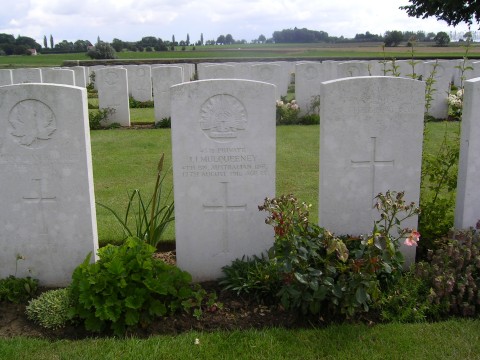An interesting quote from Robert Graves’ autobiography, Goodbye to All That (London: Penguin, 1960 [1929]), 120. He was in London on leave; the date is not specified but it was before Loos, so I’d guess it was late summer, 1915.
The Zeppelin scare had just begun. Some friends of the family came in one night, and began telling me of the Zeppelin air-raids, of bombs dropped only three streets off.
‘Well, do you know,’ I said, ‘the other day I was asleep in a house and in the early morning a bomb dropped next door and killed three soldiers who were billeted there, a woman, and a child.’
‘Good gracious,’ they cried, ‘what did you do then?’
‘It was at a place called Beuvry, about four miles behind the trenches,’ I explained, ‘and I was tired out, so I went to sleep again.’ ‘Oh,’ they said, ‘but that happened in France!’ and the look of interest faded from their faces as though I had taken them in with a stupid catch. ‘Yes,’ I agreed, ‘and it was only an aeroplane that dropped the bomb.’
Graves doesn’t dwell on what’s going on back in the UK very much (at least not so far; I’m only half-way through). But he manages to pack a number of themes into these few sentences: the gulf in experiences and attitudes between soldiers and civilians; the perceived frightfulness of civilians being attacked; and the extreme fear in Britain of the Zeppelin at this time, which Graves gently mocked. J. F. C. Fuller wrote in 1923 (in the context of his version of a knock-out blow theory) that ‘soldiers are controlled by discipline, civilians by fear’;1 Graves’s anecdote might be another expression of the same idea. But this is from the (apparently substantially) revised edition published in 1957, so I’d want to compare it with the 1929 original first.
![]() This work is licensed under a Creative Commons Attribution-NonCommercial-NoDerivatives 4.0 International License.
Permissions beyond the scope of this license may be available at http://airminded.org/copyright/.
This work is licensed under a Creative Commons Attribution-NonCommercial-NoDerivatives 4.0 International License.
Permissions beyond the scope of this license may be available at http://airminded.org/copyright/.
- J. F. C. Fuller, The Reformation of War (London: Hutchinson & Co., 1923), 105. [↩]




I’ve just been reading Curzio Malaparte’s Kaputt, whose final chapter is a sort of redemption-through-KOB tale. The protagonist, Malaparte himself, having been locked up during the overthrow of Mussolini, returns to Naples just before the Allied landing, and claims to find a sort of re-identification with the people in the city, heavily bombed and abandoned by the rich and powerful, in being reduced to sharing their poverty.
However – although the book was originally given as a memoir, he cannot be treated as a historical source. (Example: he writes about a pogrom in the Romanian city of Jassy, assigning himself a heroic role trying to save Jews, despite the fact that he wasn’t actually there and reported sympathetically to the pogrom-ers in his newspaper back in Italy.) Apparently, much of the book was written when he still thought the Germans would win the war, and then revised after 1943.
However, it’s worth reading for the fascist high society, and in your case for the notion of moral redemption through strategic airpower.
Oh, interesting, I think I’ve heard of Malaperte before. No doubt he was aware of Douhet, and the Fascists were very airminded at times, what with Italo Balbo and all. I’m not aware of any detailed studies of Italian airmindedness, I’d be interested to hear of any if they exist.